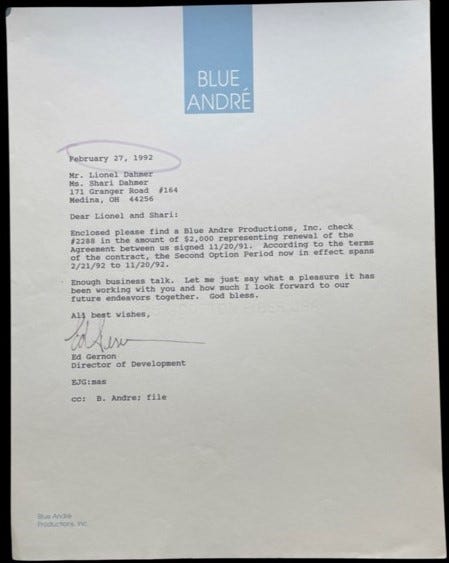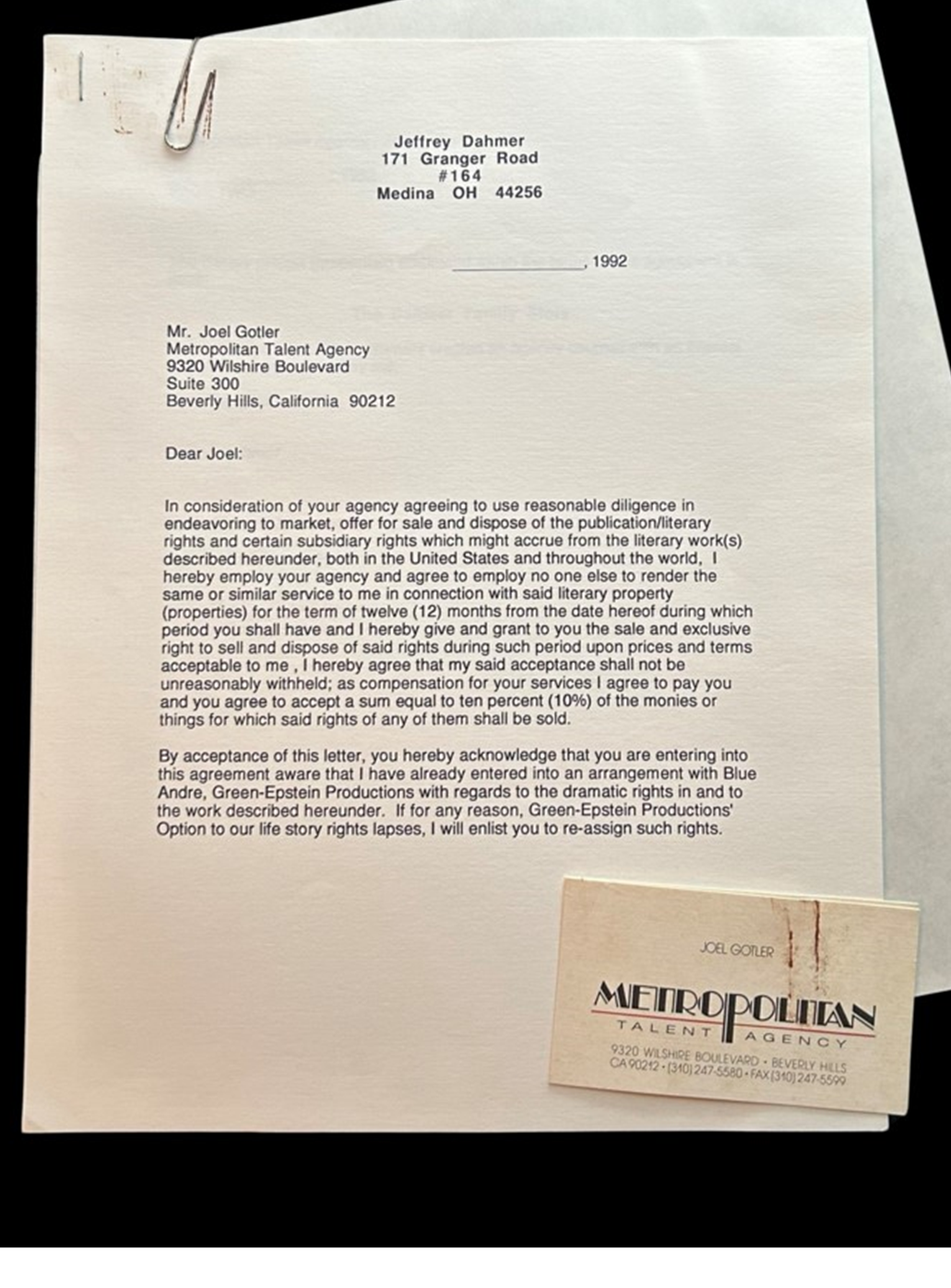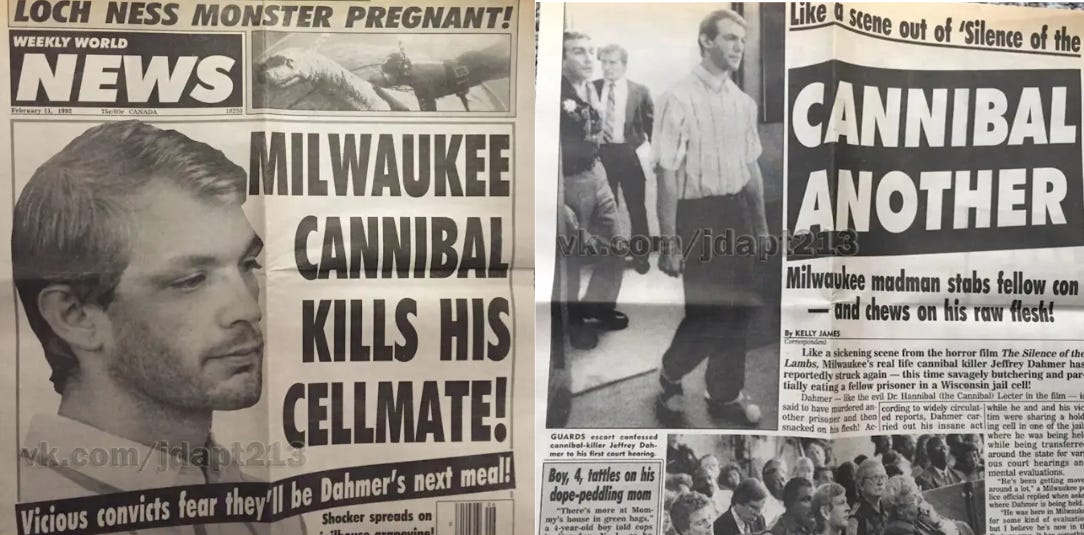Jeffrey Dahmer: Hollywood's Fabricated Truth?
Beyond the Netflix series, the unsettling truth about the 'Milwaukee Cannibal' emerges.
For decades, the name Jeffrey Dahmer has evoked visceral horror—grisly imagery, sensational headlines, and a legacy of terror cemented in America’s collective psyche. But what if that entire narrative was less true crime and more true fiction?
Recent discoveries linking Jeff and Lionel Dahmer to prominent Hollywood figures suggest that the ‘‘Milwaukee Cannibal’’ saga may have been a choreographed spectacle—more script than scandal, more PR campaign than pathology.
From suspiciously timed film contracts to quotes lifted straight from movie scripts, it’s time to reconsider the narrative that’s been sold to us…
Lionel Dahmer’s Movie Deal: A Pre-Trial Production?
Imagine your child is arrested for one of the most heinous crime sprees in American history. Your life is upended. Grief and disbelief consume you. So what’s your next move?
If you’re Lionel Dahmer, you apparently sign a Hollywood movie deal—before the trial even begins.

Just four months after Jeffrey Dahmer’s sensational arrest and a little over two months before the highly anticipated trial began, Lionel signed (and later renewed) a movie deal.
Excerpts from the letter, dated February 27, 1992, reveal:
‘‘Enclosed please find a Blue Andre Productions Inc. check #2288 in the amount of $2,000 representing renewal of the Agreement between us signed 11/20/91.’’
‘‘According to the terms of the contract, the Second Option Period now in effect spans 2/21/92 to 11/20/92.’’
‘‘Enough business talk. Let me just say what a pleasure it has been working with you and how much I look forward to our future endeavors together.’’
A ‘‘second option period’’ in a contract is essentially a pre-negotiated extension. It grants one party more time to decide on a deal (like buying film rights), typically in exchange for an additional fee. The check for $2,000 likely represents the payment for this second option period..
The sender of this letter? Ed Gernon, a name that also appears on Jeffrey Dahmer’s alleged visitation list. Ed Gernon’s IMDb profile confirms his extensive career as a producer, director, and writer in the Hollywood film industry, boasting numerous distinguished credits.

In his book, A Father’s Story, Lionel Dahmer explicitly credits Ed Gernon for initiating his book project, noting him as ‘‘a screenwriter in Los Angeles.’’
So why would a grieving father choose to negotiate entertainment rights in the middle of his son’s criminal proceedings? Why was a Hollywood screenwriter granted visitation access?
These aren’t details the nightly news ever shared.
A Killer with a Talent Agent?
Things get stranger.
A letter from 1992 reveals that Jeffrey Dahmer had representation from the Metropolitan Talent Agency, located in Beverly Hills, California. This letter was addressed to Joel Gotler, a known Hollywood power broker in literary-to-film adaptations.
Also worth noting: the address listed on the Dahmer agency document is 171 Granger Road, Medina, OH—the same residence where Lionel Dahmer was living at the time. Public records confirm this.

This letter was all about securing the right to use Jeffrey Dahmer’s likeness. But what does that really mean? Simply put, the right of publicity gives you control over your identity. It protects your name, image, or unique persona from being used for commercial purposes without your permission.
And what about the “law of likeness”? At its core, it’s all about safeguarding your name and image from misuse or exploitation. It’s a way to protect your identity and privacy from unwarranted intrusion.
When someone uses a person’s likeness without permission—or beyond what’s allowed in a contract—it’s considered a breach of contract and can violate their right to privacy.
So, how do you get permission to use someone’s likeness? The answer is simple: you need their consent!
In Jeffrey Dahmer’s case, stories published about him without his consent could have crossed the line into defamation, raising serious concerns about truth and accountability. The letter represents Jeff’s agreement to the countless bizarre media stories published about him (examples shown below).
The broad categories of ‘‘publication/literary rights,’’ ‘‘subsidiary rights,’’ and especially ‘‘life story rights’’ in the letter are expansive enough to cover his likeness and story being used in various media, including newspapers, magazines, and other forms of public dissemination, for commercial purposes.
So, in essence, Jeffrey Dahmer was actively pursuing monetization and control of the commercial use of his ‘life story’ and likeness across a wide range of media formats through this arrangement.
In A Father’s Story, Lionel Dahmer again thanks Gotler by name, praising his ‘‘insightful advice’’ and ‘‘rapid response’’ as his literary agent. The Metropolitan Talent Agency is still operational today, and still specializing in entertainment deals.
Let’s ask the obvious: Do real serial killers negotiate with talent agents? Do they sign with book rights firms and engage in industry-standard PR? Or does that sound more like the behavior of a character actor—or a narrative being sold?
Scripted Confessions? Inside Edition’s Odd Lines
Adding another layer to this spectacle is the 1993 Inside Edition interview featuring Nancy Glass and Jeffrey Dahmer. Shockingly, some of Dahmer’s statements in the interview match word-for-word with lines from Carl Crew’s 1992 comedy-horror film, The Secret Life: Jeffrey Dahmer.
In the interview, Dahmer presents these lines as his own ‘memories.’ Watch:
Here’s where it gets even stranger—Crew’s movie was filmed between May and July 1992, just weeks after Dahmer’s sensational trial ended. It was ready for distribution by September 1992 and went straight to video in January 1993, long before the Inside Edition interview aired in February 1993.
Carl Crew stirred up even more controversy when he promoted his film on The Maury Povich Show: The Jeffrey Dahmer Movie Controversy on September 28, 1992 (you can still find it online).
The tabloid-style show sparked ‘outrage’ among the families, mirroring the ‘backlash’ Netflix faced during a similar promotion in 2022—right down to the same key players reappearing. History really does repeat itself!
Coincidence? Possibly. Pattern? More likely.
If Dahmer was reciting lines—or being coached to deliver them—it raises deeper questions: Was this “confession” a performance? Was the media presenting a rehearsed villain instead of a real one?
The Truth Behind the Sensationalism
The compelling evidence presented here suggests that the narrative surrounding Jeffrey Dahmer as the ‘‘Milwaukee Cannibal’’ has been significantly fabricated.
It highlights a troubling reality of how the media and entertainment industry can manipulate facts, creating sensationalized stories that monopolize public attention and skew perceptions.
This isn’t just about one man’s guilt or innocence. It’s about how the American media ecosystem can create, curate, and capitalize on fear. If true crime becomes indistinguishable from entertainment, what happens to truth?
Questions to Consider:
How does our trust in media shift if we learn that a ‘‘real’’ serial killer was essentially packaged like a movie character?
How do you interpret Lionel Dahmer’s movie contract, signed so close to his son’s so-called trial?
And in an era of manufactured narratives, how important is critical media literacy to navigating what’s real and what’s a reel?
The more we examine the ‘‘Dahmer story’’ through this lens, the clearer it becomes that the curtain may have been pulled back on a meticulously orchestrated Hollywood production, masquerading as true crime.






This again is very disturbing. A grieving father going through an ordeal of this magnitude would steer clear of anything having to do with Hollywood. A verdict has not even been reached yet. Very disturbing.
The evidence that this might have been more fiction than fact is overwhelming. Brilliant job as always